
The Economic Development and Employment Zones (ZEDE), a controversial project supported by U.S. and European investors, are a threat to sovereignty, governance and the autonomy of Honduran territory. It was promoted by former Honduran President Juan Orlando Hernández, who was convicted of drug trafficking and sentenced in the US. US companies, one of which was led by a personal assistant of Republican Senator Marco Rubio, are lobbying for this project.
Multiple companies were created to make this controversial project possible. Two of them are incorporated in Honduras and two more in Delaware and Wyoming, US. The ZEDE has incorporated more than four million square meters of Honduran territory through these companies.
Text: Marcia Perdomo
contributed to this report Katerin Galo y Joan Suazo
Editor: Emy Padilla
Photography: Horacio Lorca
Cover: Reynaldo Raudales
Visuals: Guillermo Burgos
“One cent doesn’t stand a chance against a dollar,” Ariel Webster, a 74-year-old fisherman, said as the sea rocked the boat we boarded to look at the changes Honduras Próspera Inc. had made near the village of Crawfish Rock on the island of Roatán.
Webster is not wrong. Honduras Próspera has quietly expanded its territory and incorporated 3.1 percent of land in Roatán. That’s more than 2.5 million square meters (632.8 acres) on an island that has an area of 83 square kilometers
He is an English-speaking Honduran of African and Indigenous descent and has lived his entire life in Roatán. His family used to live in Plan Grande or Big Bight, but moved to Crawfish Rock, where they have been living for 35 years. They are now neighbors of ZEDE Próspera.
For decades, he has seen the US dollar slowly become the local currency, and the land bought and sold several times as its ownership shifted from local to foreign. Foreigners are not always nice people and even control access to public beaches. They built walls on the limits of Pristine Bay, a violation of Civil Law, Article 617, which stipulates that beaches are a public good.
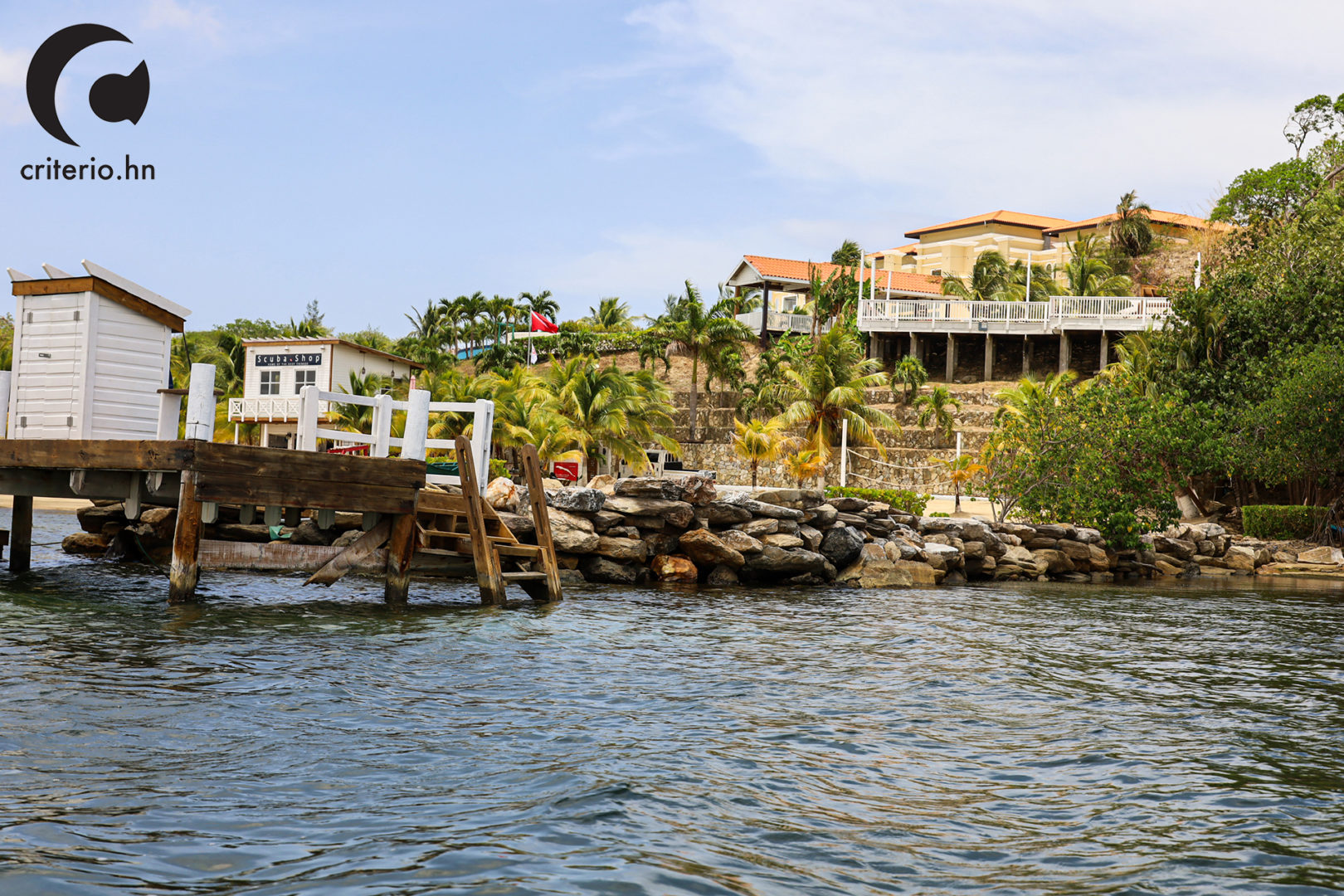
Erick Brimen or Erick Briceño?
The warm waters on this Honduran island in the Caribbean have attracted tourists and investors alike for decades. This is why Erick Briceño – born in Venezuela and now a citizen of the US, where he changed his name to Erick Brimen – visited Roatán and then established several companies with the intention of creating a “charter city” with its own form of government, laws, financial system, etc.
In order to bring this project to fruition, the then-President of Congress (2010-2014) Juan Orlando Hernández pushed, on two occasions, for the ratification of injurious laws that violate sovereignty, governance and territory – all of which are enshrined in the Honduran Constitution. He also oversaw the removal of four judges from the Supreme Court who declared the first version of the ZEDE Organic Law unconstitutional, known back then as Special Development Regions (Regiones Especiales de Desarrollo).
Brimen, who left Venezuela to study in the US, presents himself as a guru of technology and business. Criterio obtained a document that Brimen himself uploaded to his personal blog and which he signed as Erick Briceño, possibly his birth name. It is not known when or why he legally changed his last name to Brimen, as he is recognized and respected among investors and venture capitalists from Europe and the US.
The companies he established in Honduras to carry out the ZEDE project are named after him: Brimont Investments and Brimont Holding. However, he transferred most of his shares to Honduras Próspera Inc., which he leads.
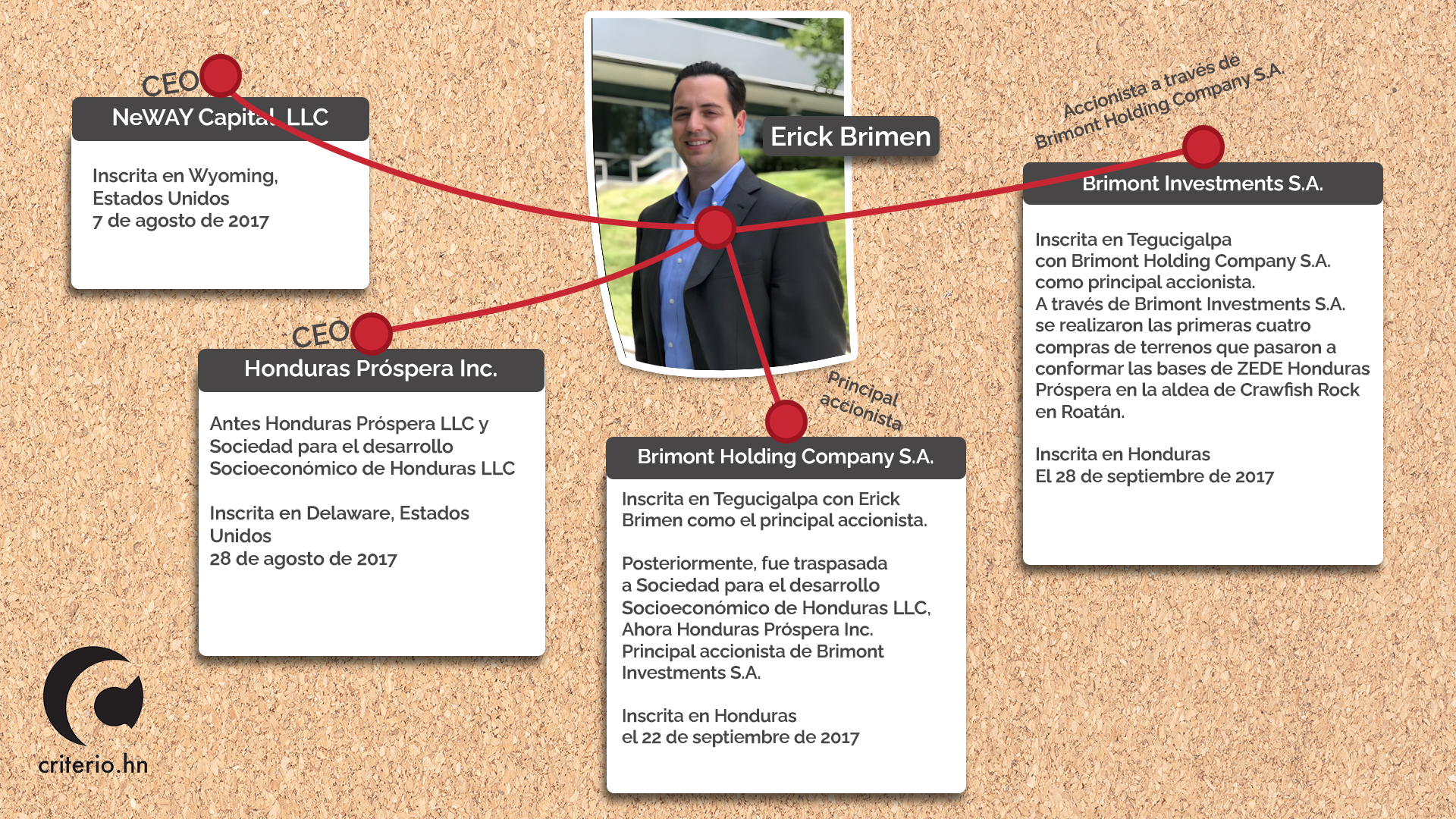
In an interview by Anthony Pompliano, Brimen said that before choosing Roatán they had investigated for over a decade. NeWAY Capital’s origins go back to 2014, when they explored – along with Babson College, an accredited US university – regulatory options in several countries to finance charter cities, as they were known back then.
Of all countries in the world, Honduras really did it, in fact, twice when they tried to reform their Constitution to create Special Development Regions (RED), but the ZEDE, in particular, that go beyond to allow any reform required by another Special Economic Zone (Zona Especial Económica) established in the region up to that point, Brimen told Pompliano.
The first actions by Brimen to develop the ZEDE project took place in 2017. On August 28, he established Sociedad para el Desarrollo Socioeconómico en Honduras LLC – now called Honduras Próspera Inc. – in Delaware, US. This state is a corporate haven that attracts businessmen who wish to avoid paying taxes in their country of origin.
In parallel, on September 22, Brimont Holdings Company Sociedad Anónima created a network with two Honduran companies in order to purchase property and further invest in more companies.
Only six days later, Brimont Investments Sociedad Anónima, whose majority shareholder is Brimont Holdings, was established. According to the certificate of incorporation, it was established to buy and sell property and goods, among other activities.
Brimont Investments S.A. bought its first property on December 15, 2017, for 5.3 million lempiras ($214,000). A second property was bought on July 13, 2018, for 18.7 million lempiras ($756,000) followed by a third property bought on December 21, 2018, for 7.9 million lempiras ($320,000). The fourth and last property was bought 19 days later, on January 9, 2019, for 15.2 million lempiras ($614,000).
These four properties are part of the village of Crawfish Rock, an area that has natural charm and is inhabited by English-speaking communities of African and Indigenous descent, whose major source of income comes from artisanal fishing and woodworking. Given the situation, Brimen saw an opportunity and offered them solutions to their problems by improving school infrastructure and creating new jobs, and that’s how he began purchasing plots of land to establish ZEDE Próspera.
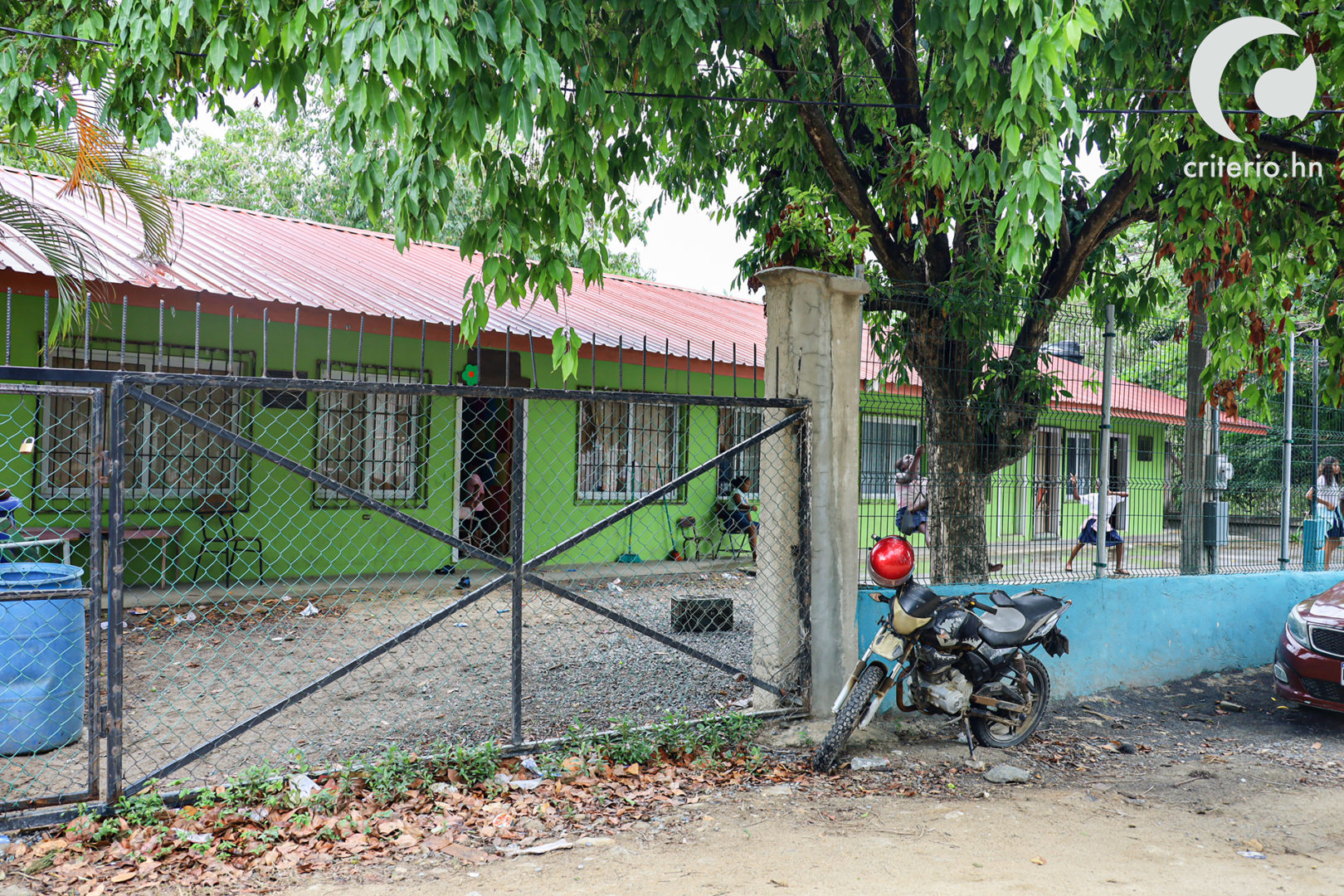
During our conversation with Webster, he told us that money does the talking and it’s the poor who suffer. His grandson, Oniel Webster, a young fisherman who saw his dream to study at a university fall apart because of poverty, confessed, as we sailed through the crystal-clear waters, that he’s afraid the ZEDE Organic Law will allow companies to expropriate his family’s land.
The most expensive property, valued at more than 18 million lempiras ($734,000), was owned by Sociedad Loma de Obos S.A., of which Jerry Hynds, the former mayor of Roatán, is a partner. This was verified by Criterio. The property was bought when Hynds was councilman and it’s not known if he – a former congressional representative for the right-wing Liberal Party and, at that moment, an ally of the elected right-wing National Party – knew about the purpose of the transaction.
Criterio tried to contact the former mayor and his assistant, but they didn’t reply. In August 2018, when he was mayor, Hynds was arrested for alleged drug trafficking charges, but was released a few hours later by a judge with national jurisdiction because there wasn’t sufficient evidence to prosecute him. The case is still open.
At the moment of his arrest, Hynds’s lawyer, Norman Reaño, said to media outlets that ZEDE Próspera and the National Party plotted against him. In response to those claims, ZEDE Próspera issued a statement denying Reaño’s allegations.
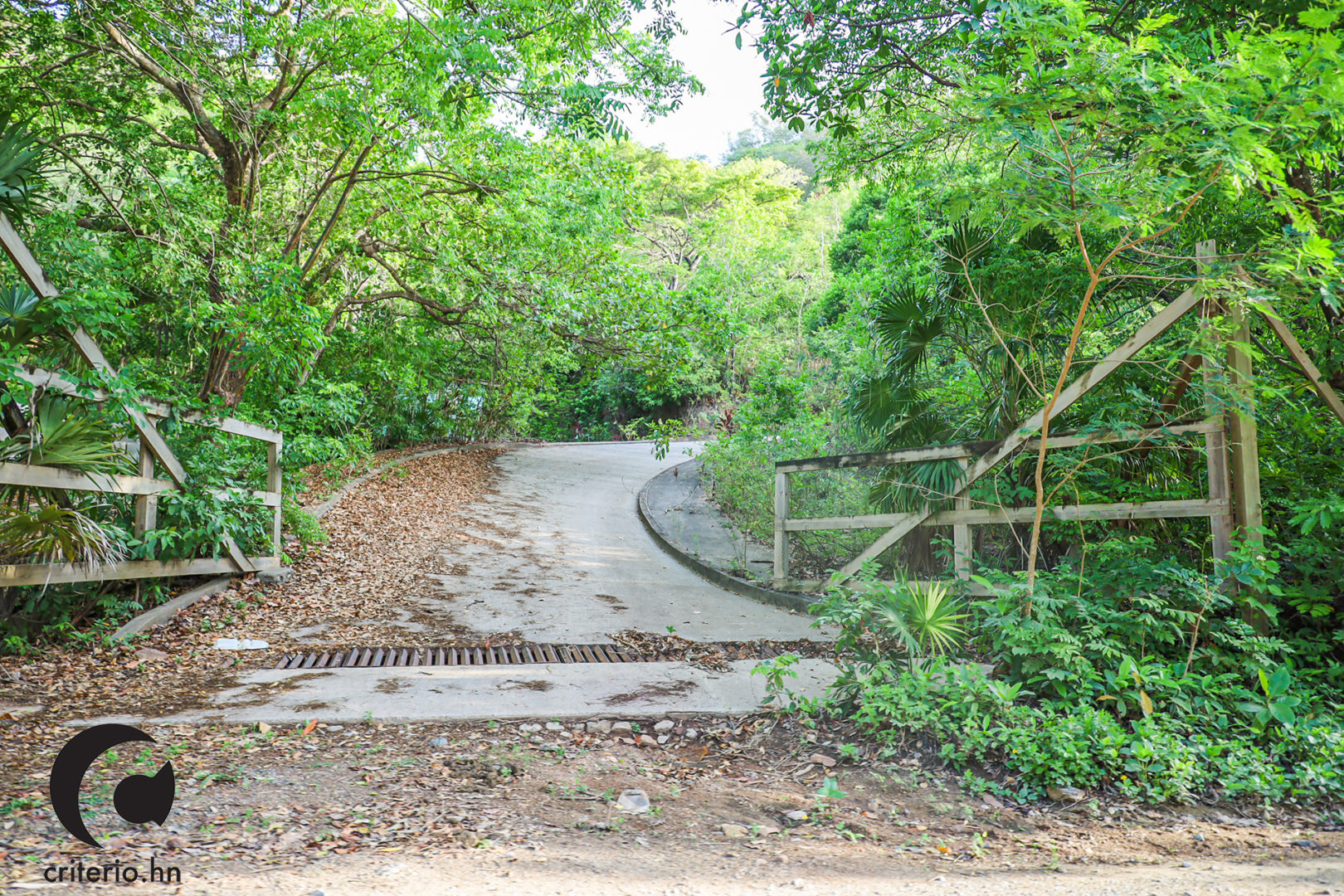
Frenetic acquisition of land in view of a possible election victory by Xiomara Castro
In November 2021, as the general elections were drawing closer, the controversial ZEDE Honduras Próspera went through a frenetic incorporation of territory in the municipalities of Roatán and José Santos Guardiola.
Próspera expanded on the opposite end of where it was originally established, in the unpaved road that leads to Camp Bay, municipality of José Santos Guardiola, where on November 4, 2021, ZEDE Próspera incorporated an important plot of land. It has an area of 965,706.24 meters square (238.63 acres) and is registered to Inversiones Colíbri S.A in the location that they established as Port Royal, which is partially mortgaged to a Honduran bank.
In fact, that was the first territorial expansion that took place after the annexation of Puerto de Satuyé, made public by Satuyé S.A. on March 18, 2021. Then a series of annexations took place in November 2021, prior to the general elections that Xiomara Castro, the current president, won.
Próspera later incorporated another property in the municipality of José Santos Guardiola, one story with a surface area of 301.18 square meters (0.07 acres) at the Parrot Tree Hotel. The incorporation was made public in Honduras’ official gazette: “The first story in building #8, Marina Fronts Villas.” It is owned by International Medical Services S.A. and its representatives, Glenn Coughran Terry and Heather Terry. According to official statements, the property is a condominium.
It’s difficult to understand how Próspera is growing; it was established in Crawfish Rock, but then incorporated properties in different geographical locations. It’s located in two municipalities on the island of Roatán. The company had also sought properties on mainland Honduras, in Puerto de Satuyé in the city of La Ceiba, where it incorporated more than 1.5 million square meters as well as a 300-m² apartment in a luxury resort.
In addition to the initial four property incorporations by Brimont Investments S.A. in Crawfish Rock – which add up to 205,248.71 square meters or 50.717 acres, according to data from the Land Registry – made public on June 20, 2019, four properties were incorporated in the municipality of Roatán. This annexation took place when the project was called ZEDE Village of North Bay (ZNB), which later became ZEDE Próspera.
Among these incorporations, three stand out at the exclusive resort and golf club in Pristine Bay, in the village of Crawfish Rock. These incorporations were made public on November 18, 2021, ten days before the general elections in Honduras. One of the owners is BBI Roatán LLC, whose territorial extension amounts to 500.18 square meters (0.12) acres.
A second incorporation by Inversiones SJ, S.A. de C.V., who owns 322.824 acres, of which only 1,197,492.88 square meters (296 acres) could be verified by Criterio. This company was involved in a series of atypical activities: buying those properties to Guatemalan banks, then taking out a mortgage on one of them in less than a month and eventually having the mortgage released in less than five months.
A third incorporation of 84,253.6 square meters (20.82 acres) by McNab D.H. Land at Pristine Bay is documented in the Land Registry despite also being documented by Próspera as its own property.
This property was collectively owned, but, in 1995, a property deed was issued to David Henson McNab, general manager at D.H. Land Investment S.A., who purchased the property for 17,168.89 lempiras ($695), that’s 10 percent of the property value recorded in the Land Registry.
Lastly, on November 18, 2021, Erick Brimen proceeded with a fourth property acquisition after being appointed in a Power of Attorney Document to act on behalf of Roselin Rebeca and Clark David Johnson Abott. The property has an area of 6,535.50 square meters (1.615 acres).
Due to all these property incorporations taking place before the 2021 general elections in November – and despite the unpopularity of the ZEDE and the National Party, which had been in power for 12 years – it’s safe to say that ZEDE’s management anticipated that the party that promoted this project back in 2013 was not going to be reelected.
It’s difficult to determine the amount of properties incorporated by Honduras Próspera Inc. because there were irregularities in the process, and agreed upon prices are significantly below those of the market. For instance, the average price paid for a square meter of land by Brimont Investments S.A. between 2017 and 2019 was 230.07 lempiras ($9.43), but the average market price in the area is around 15,000 lempiras ($607), according to data of beach properties provided by real estate companies.
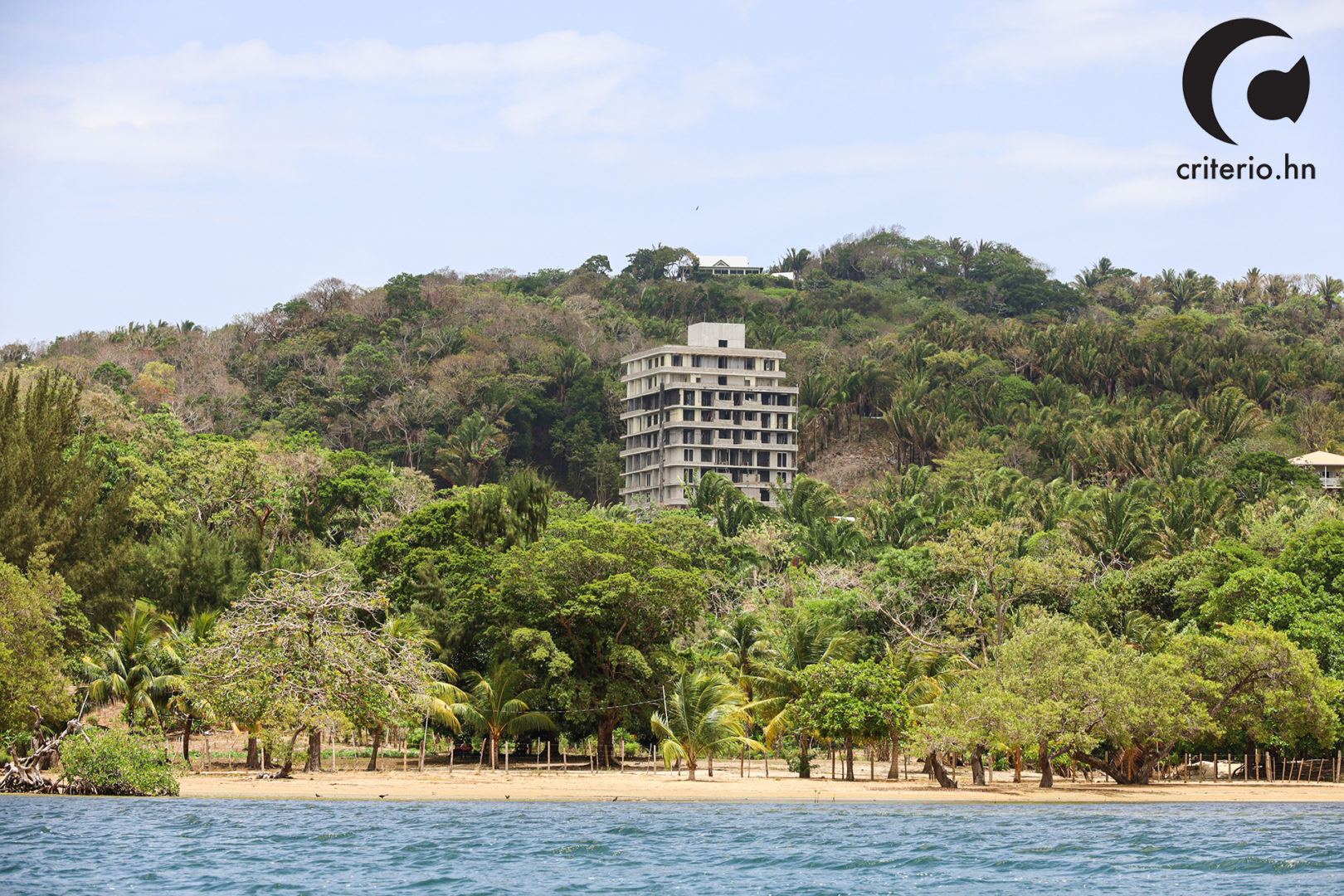
Próspera’s expansion in Roatán
The amount of territory incorporated by Próspera in Roatán was confirmed by Jorge Colindres, technical secretary at Próspera ZEDE, who participated in a social media survey conducted by Criterio before the publication of this article in which we asked: “What percentage of the island has been incorporated by Próspera?”
Colindres said the company has incorporated about 3 percent of the island and asserted that they have created more than 1,000 jobs, attracted more than 140 companies and generated an investment of $100 million.
This calculation doesn’t include the incorporation of Puerto de Satuyé by Satuyé S.A. from March 2021, which is one of the three largest properties owned by Próspera. Satuyé – located in the city of La Ceiba, in the Atlántida department – makes up 1,557.084.70 square meters (384.76 acres) of the total 4,033,704.19 square meters (996.75 acres) owned by Honduras Próspera Inc.
The other two large property incorporations on the island are Pristine Bay in Crawfish Rock, municipality of Roatán, and a third property in the municipality of José Santos Guardiola.
Lobbying and interference from the US
Six members of the House of Representatives in the US sent a second letter to US Secretary of State Antony Blinken and US Trade Representative Katherine Tai, urging them to intervene by “enforcing investor protections” and “ensuring serious consequences result from violating the rule of law.”
The letter states that the Castro Administration “is taking threatening actions to expropriate resources from US investors in Próspera.” They are quoting the 2022 Investment Climate Statements and dismiss, either knowingly or not, the fact that investments by Honduras Próspera Inc. in the ZEDE with the same name are not just any type of private investment since they have implications on Honduran sovereignty, governance and territory.
The signatories are: Warren Davidson (representative for Ohio’s 8th congressional district since 2016), María Salazar (Cuban American representative for Florida’s 27th congressional district since 2021), Greg Steube (representative for Florida’s 17th congressional district since 2019), Nancy Mace (representative for South Carolina’s 1st congressional district since 2021), Alex Mooney (representative for West Virginia’s 2nd congressional district since 2015) Paul A. Gosar D.D.S. (representative for Arizona’s 9th congressional district since 2023), Byron Donalds (representative for Florida’s 19th congressional district since 2021) and Chip Roy (representative for Texas’ 21st congressional district). They are all Republican.
“The Castro Administration cannot be allowed to expropriate U.S. investors without adequate compensation. Investor protections are both moral and practical requirements of U.S. trade policy.” The letter also demands in clear terms “just compensation.”
Another similar letter was sent to Blinken and Tai by 17 other Representatives, most of them Republican, requesting protection for US investors against expropriation.
According to an investigation carried out by Criterio based on Próspera’s property incorporations and its corresponding private registry, these investors own, under the ZEDE governance system, 3 percent of properties in Roatán. The Honduran government, however, has not expressed any intentions of expropriating properties from investors after the repeal of the ZEDE Organic Law.
Additionally, Laura F. Dogu, US ambassador to Honduras, stated during the 2022 AmCham that they will continue exercising their right to meet with US investors after strong criticism from the population in response to the meeting of Roy Perrin, deputy chief of mission, and Próspera investors.
In the midst of the dissatisfaction expressed by US representatives regarding the repeal of the ZEDE law, Honduras Próspera Inc. hired two lobbying firms: Navigators Global LLC and King & Spalding LLP, the former to lobby for “economic development” and “support concerning the Foreign Assistance Act,” and the latter for “US investments in Honduras.”
In the US, Honduras Próspera Inc. spent around $130,000 on lobbying: $90,000 in 2022 and $40,000 by the second quarter of 2023.
Among the four lobbyists hired, two stand out: César V. Conda of Navigators Global and Kendrick B. Meek, Representative for Florida’s 17th congressional district between 2003 and 2011, of King & Spalding LLP, hired in June 2023.
While the numbers are modest compared to the financial resources Honduras Próspera Inc. and its associated companies manage, it’s worth noting that César V. Conda was co-founder of Navigators Global in 2009 and also served as chief of staff for Marco Rubio, Republican senator of Florida, and national policy assistant for Dick Cheney, former US vice-president. Records show that services provided by Navigators Global LLC and César V. Conda concluded on January 19, 2023.
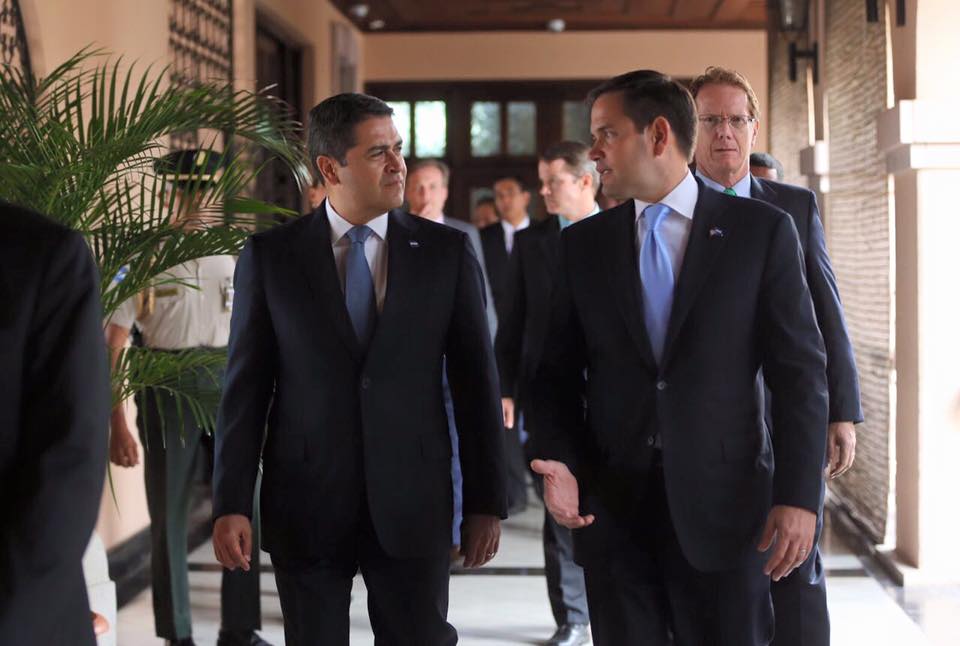
The fact that the Honduran population widely rejects the ZEDE and understands the obvious objective of severing part of the territory in favor of anarcho-capitalism is of no concern to the Department of State, the US Embassy in Honduras and policy makers of both legislative chambers who have defended US investments from an “imminent expropriation.”
But if Honduras Próspera Inc. is facing an “imminent expropriation” in Crawfish Rock, it doesn’t seem to interrupt developments, including tree felling, or the incorporation 1,790,729.31 square meters into ZEDE Próspera in November 2021, when elections took place.
According to Luisa Connor, president of the council at Crawfish Rock, the claim filed by Honduras Próspera Inc. against the Honduran State in February should halt developments in the area until the arbitration comes to a conclusion. At the time this article was published, the process was still underway.
She added that the well that has been providing water to the community as its main source has dried up, and they are afraid the same will happen to the second well due to deforestation and excessive use of water in the area.
When reality surpasses the original plan
Regarding the expansion plans and the incorporation of more land, Colindres said during a phone interview prior to social media publications on Tuesday, August 1, that “the original investors’ plan spanned approximately 700 acres.”
This means that they are 67.2 acres [271,948.8 square meters] short of reaching their goal in Roatán, but that goal is surpassed if they take into account the 384.76 acres incorporated by Satuyé S.A. on the mainland.
Colindres, a lawyer, maintains that “from a legal perspective it’s a right that the legislation remains in force and that all of these procedures [incorporation of territory] remain legal, and that applies to additional incorporation of land.” He admits that “it’s difficult to carry out the original plan in the current situation,” but “the investors’ plan is to proceed with the investment project under guarantees provided by the Honduran State.”
Colindres is referring to the repeal of the ZEDE Organic Law – still pending ratification – by National Congress and the reason why Honduras Próspera Inc., St. John’s Bay Development Company LLC and Próspera Arbitration Center LLC filed a $10.775 billion claim with the International Center for Settlement of Investment Disputes (ICSID) against the Honduran State arguing that US investors are facing “imminent expropriation.”
Although investors feel threatened by the Castro administration and Colindres believes that “the government is promoting an undemocratic socialist model,” developments at ZEDE Próspera’s main location in Crawfish Rock, and foreign interference from some sectors of the US government continue.
Colindres is confident that “the repeal of the ZEDE Organic Law doesn’t affect its validity. The ZEDE law is and will continue to be in force during the 50-year period of legal stability granted by the Honduran State.
He added, “Próspera ZEDE along with around 140 companies, which are already established in the ZEDE, continue to operate and exercise their legal rights even after the repeal.” Colindres still considers himself a public official of the Honduran State.
Similarly, Massimo Mazzone, ZEDE Morazán investor, pointed out that despite the repeal of the ZEDE Organic Law, a legal stability agreement will ensure that all three projects continue for 50 years.
Mayor of Roatán denies that ZEDE increases investment in the municipality
In contrast to Colindres’ statements and the $100 million investment, Ronnie McNab, mayor of Roatán, denies that this investment has had a positive impact on the municipality’s income or the development of public works.
“ZEDE has not brought any type of investment that benefits the municipality of Roatán. While it’s true that any type of investment creates employment, which is beneficial to the population, they refuse to pay for construction and operating permits and to obtain local environmental licenses, and that has a negative effect on the municipality’s income,” McNab told Criterio.
McNab, a former congressional representative from the Liberal Party, affirmed that they support and encourage investment as long as it’s organized, legal and in compliance with tax policy because taxes are essential for social investment in the municipality and in the country.
When asked about what actions the municipal council of Roatán has taken to enforce processes established by Honduran legislation, McNab evasively said that they file reports and complaints, issue orders of payment for constructions as well as other actions, but didn’t show the corresponding documentation. He stated, however, that they can’t do much since the government refuses to act against these institutions.
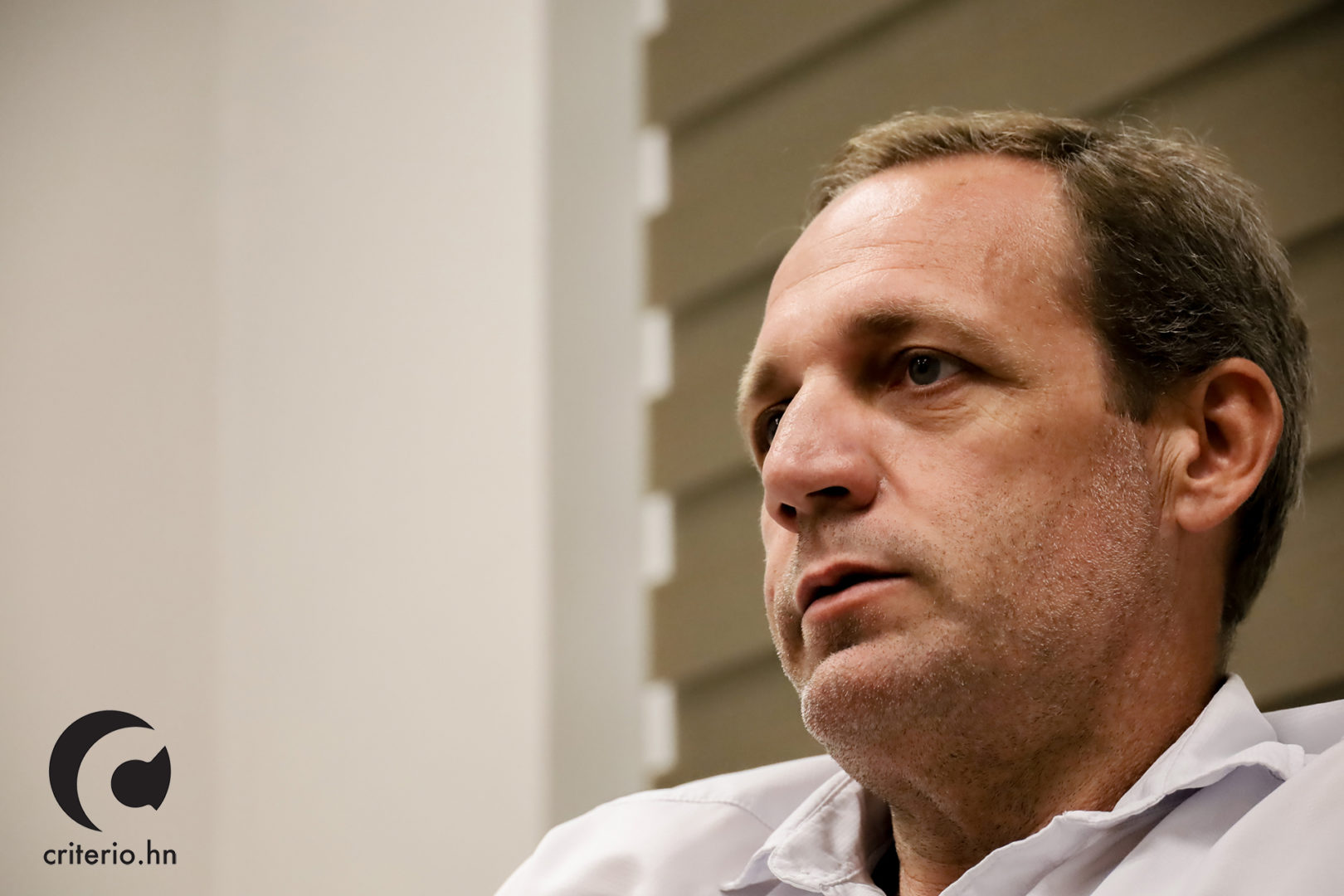
Where there’s smoke…
Regarding the incorporation of more land by Próspera, McNab stated that he only heard rumors, just like the rest of the population, and affirmed categorically, “Our system is ethical and we will never allow them to take property from the Land Registry and the municipality. We will not allow it!”
While McNab affirmed that they have estimates of the amount of taxes they no longer receive, he didn’t give an exact number. They do know, however, about smaller projects and taxes paid on registered properties, but not about all properties, which is why it’s hard to know for certain how much income the municipality has lost. This is aggravated by a common practice followed by many landowners: paying taxes on their properties every three to five years.
ZEDE Próspera hasn’t paid taxes for their business activities on the island, McNab added.
At the other end of the island, in the municipality of José Santos Guardiola, which in July 2021 was declared free of the ZEDE during an open meeting of the council, Vilma Xiomara Gómez, the 8th city councilor for the National Party, affirmed that no rumors of a territorial incorporation to ZEDE Próspera or others have been heard at the municipal council.
She stressed that it was previously established and recorded that the ZEDE would not be allowed in the municipality, but acknowledged that investors, whether individually or as members of a business, have visited local communities.
Gómez explained that there is a strong presence of Czechs in the municipality, especially in hamlets at Diamond Rock, where they own an extensive nature reserve. “Many investors are moving there, and we know there’s a Czech population investing in the area. We have information that shows they have been paying municipal taxes in accordance with the law,” she said.
Colindres affirmed that there are more than 1,200 residents, Honduran and foreign, in ZEDE Próspera. That includes 600 permanent ZEDE employees as well as entrepreneurs and others who sympathize with the governance system. “The ZEDE Organic Law requires all individuals to consent to an Agreement of Coexistence. They’re either physical residents or e-residents and don’t necessarily live within the ZEDE,” he added.
ZEDE’s original sin
Properties that now constitute Honduras Próspera Inc. were incorporated into the governance system created under the ZEDE Organic Law. It was promoted by the administrations of Porfirio Lobo Sosa and Juan Orlando Hernández, both members of the National Party. The latter sought a second presidential term despite a clear ban on reelection in the Honduran Constitution.
It’s important to point out that in order to allow ZEDEs to operate, Hernández plotted to remove judges from the Supreme Court (Corte Suprema de Justicia), an institution that declared several laws, including those concerning the Special Development Regions (ZEDE’s predecessor), unconstitutional.
Supreme Court judges argued that the reform of Articles 304 and 329 of the Honduran Constitution violates sovereignty, governance and territory, thus rendering Special Development Regions (RED) unconstitutional.
This action, and others, led to the dismissal of four of the five Supreme Court judges – except for Óscar Fernando Chinchilla, the former attorney general (September 2013 – September 2023) – who previously voted against REDs on the grounds of unconstitutionality, but since the motion didn’t secure unanimity, a plenary session was called in which these regions and the laws promoting them were declared unconstitutional. Chinchilla voted against and Jorge Rivera Áviles, then president of the Supreme Court, abstained from voting.
The declaration of unconstitutionality was issued on October 17, 2012, and was supported by lawyers, farmers and Indigenous communities who gathered outside of the Court. From the beginning, REDs and ZEDEs were utterly rejected by the Honduran population, including social movements.
Despite the declaration by the judiciary in 2012, the National Congress, presided by Hernández, ratified the ZEDE law and Decree 368-2013, and appointed all 21 members of the Committee for the Adoption of Best Practices (Comité para la Adopción de Mejores Prácticas – CAMP), an entity that in theory supervises ZEDE’s activities.
Only four members of the Committee are Honduran: Ricardo Maduro Joest, former president of Honduras; Ebal Jair Díaz Lupian and Ricardo Leonel Cardona López, both naturalized Nicaraguan citizens who are under investigation for corruption; and Octavio Rubén Sánchez Barrientos, former staff minister of the Lobo Sosa administration.
From 2013 to the present, different people have held positions in the Committee and despite the election of a new government, the names of the members are not known. Criterio has inquired five times about individuals who have replaced original members, but the list remains unchanged even though some members have passed away or quit their positions.
Regarding the Permanent Commission of the CAMP, in the aftermath of Jorge Colindres’ appointment as technical secretary of ZEDE Próspera, Criterio found out in October 2022 that Ebal Díaz was acting as president of the PC-CAMP, Erick Felipe Hernández Sánchez as minute secretary and Carlos Eduardo Suazo Pineda as treasurer. Both Arnaldo Castillo Figueroa and Francisco René Flores Bonilla were members and owners.
Criterio verified that Ebal Díaz, now a Nicaraguan citizen, received an annual salary of $70,000 in addition to benefits related to food expenses, travel allowances, medical insurance and others.
During interviews by Criterio, Jorge Colindres and Massimo Mazzone affirmed that they do not know who comprises the current CAMP, which is surprising since Honduras Próspera took on the responsibility to pay salaries to members of the Permanent Committee. “At this time I wouldn’t even know where to find the Committee,” Mazzone stated.
This investigation was carried out in collaboration with the Consortium to Support Independent Journalism in Latin America (CAPIR), which is led by the Institute for War and Peace Reporting (IWPR).
Former Honduran President Juan Orlando Hernández was awaiting trial at the time this article was published in Spanish on August 9, 2023. In March 2024, he was put on trial and found guilty of drug trafficking, and sentenced to 45 years in prison by the US District Court for the Southern District of New York in June 2024. The former Attorney General Oscar Chinchilla, an ally of Hernández, finished his term on September 1, 2023.